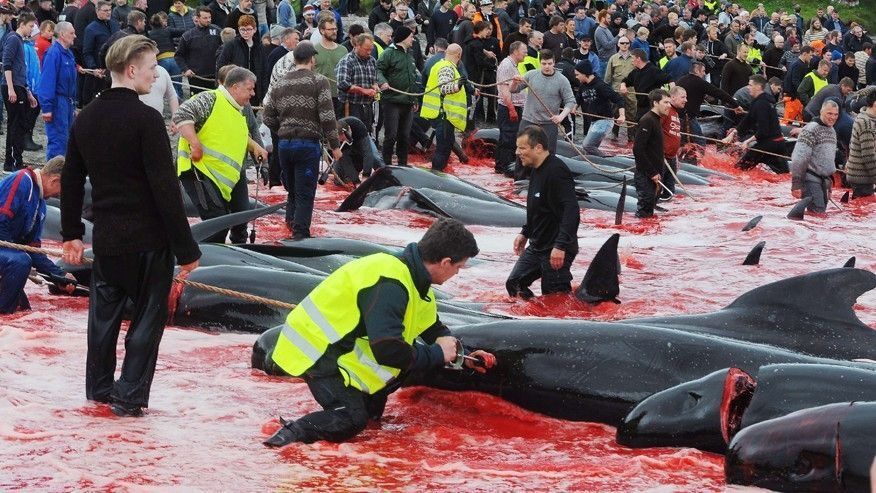Whale Hunts in the Faroe Islands Continue Despite Coronavirus Social Distancing Measures.
News from the Faroe Islands is bleak this year, with nearly 300 whales hunted and killed since the start of their whaling season in May. These vicious killings occurred despite simultaneous announcements that large gatherings are to be avoided due to social distancing measures during the coronavirus outbreak.
Midway between Iceland and Scotland, whale hunters in the Faroe islands have been killing pilot whales for centuries. Pilot whales visit the deep fjords of the Faroe Islands to hunt squid and mackerel
Up to 250 long-finned pilot whales ( Globicephala melas
)and 35 Atlantic white-sided dolphins ( Lagenorhynchus acutus
)were hunted and slaughtered on July 15th despite the concerns for the outbreak of coronavirus in the Danish territory of the Faroe Islands. To date among a population of 52,100 islanders, there have been 188 confirmed COVID-19 cases to date with no deaths recorded. This is the 6th "Grindadráp" since 2015, as the whale hunts, although mostly occur during the summer months, can be called for anytime of the year. When someone spots a pod of the mammals, none of which are on the endangered list, including bottlenose dolphins ( Tursiops truncatus
)they alert the so-called "grind master" who starts the hunt.
On average the Faroese hunt kills 800 pilot whales per year, yet the whale hunts are defended by the Faroese government, claiming the cruel practice is 'sustainable' and 'regulated', as pilot whales are considered "favourable conservation status". There are an estimated 778,000 whales in the eastern North Atlantic region. Approximately 100,000 swim close to the Faroe Islands. The hunt provides food for the local population of around 10,000 people, however, consuming whale meat can be dangerous for human health, given the toxic content of their blubber from the accumulation of heavy metals, such as mercury and cadmium and other pollutants, such as polychlorinated biphenyls (PCBs).
Read more here: https://www.orcireland.ie/toxic-pollutants-found-in-the-blubber-of-long-finned-pilot-whales
and here.
The whale hunts in the Faroe islands involves the harassment of pilot whales by small boats which drive the whales into a "killing beach". Herding can take between 30 minutes up to four or five hours. The whales are then gaffed (hooked) by their blowholes and dragged onto the rocks and sand where they are slaughtered in the presence of their family members. This is a slow and torturous death as they sever the whales spinal cord, paralysing them to let them die slowly. Pilot whales are renowned for forming tight knit social bonds with their family members, one reason as to why this species is prone to mass strandings.
Whaling has been practiced in the Faroe Islands since about the time of the first Norse settlements on the islands in around the 10th century. Records of all pilot whale hunts have been kept since 1584. Since 1584 there have been almost 2000 pilot whale catches. Of these, 67 % have occurred between July and September. However, in recent years, among a global biodiversity crises, the Faroese government fail to ensure the protection of these species and ignore Denmark's international legal obligations. Denmark ratified the Bonn Convention (Convention on the Conservation of Migratory Species of Wild Animals) in 1983. Since 1990 this membership has also covered the Faroes. The North and Baltic Sea populations of pilot whales are listed under the Bonn Convention on Appendix II. These stocks are covered by a regional agreement under the auspices of the Bonn Convention known as ASCOBANS (Agreement on the Conservation of Small Cetaceans in the Baltic and North Seas), to which Denmark is a Party. This agreement unfortunately does not extend to the Faroe Islands.
Unfortunatly, this is just the beginning of the pilot whale hunting season, with the best time for pilot whales being August, when most whale catches have taken place over the past 450 years.
SHARE THIS ARTICLE















